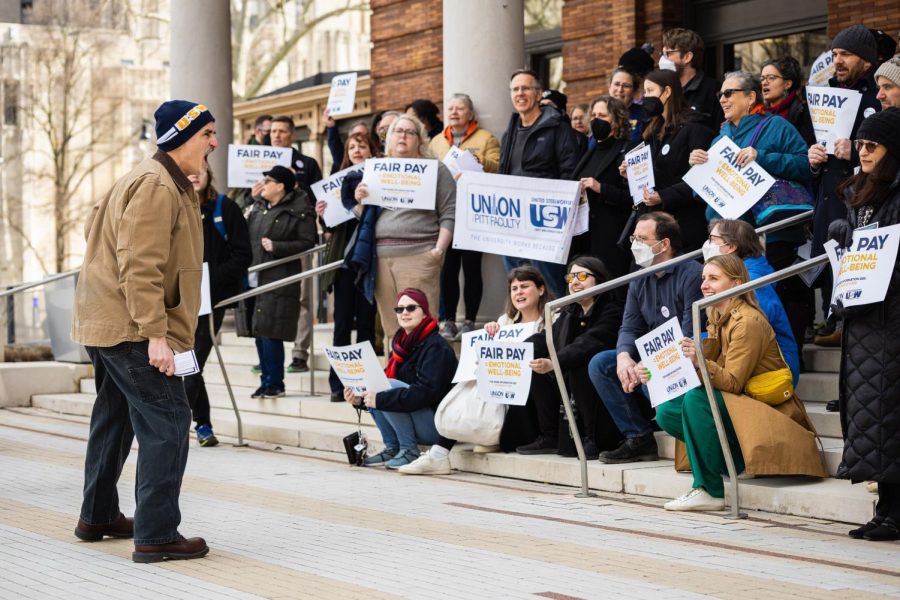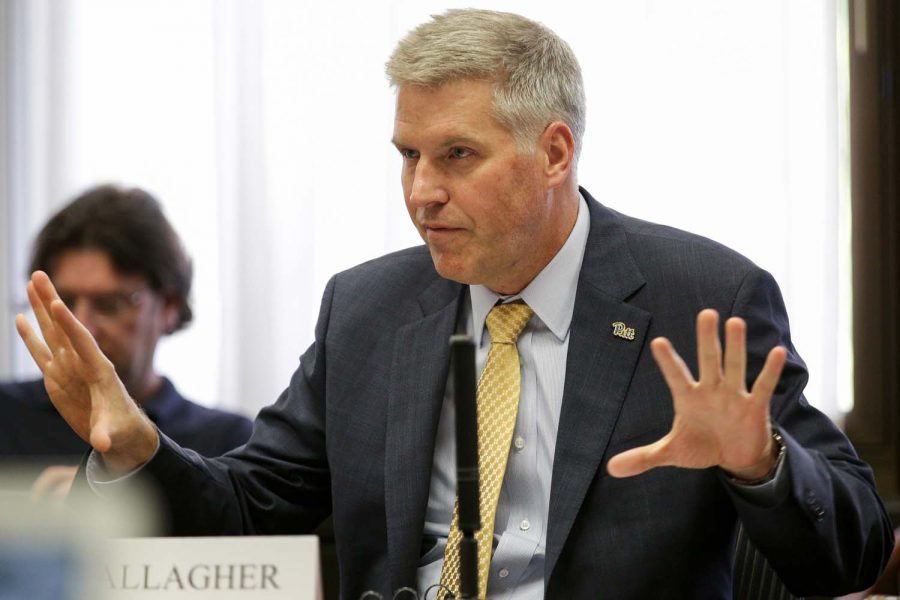Gallagher reports record applications, growth in research at Board of Trustees meeting
Chancellor Patrick Gallagher.
February 26, 2023
Chancellor Patrick Gallagher touted Pitt’s “positive momentum” during his report to the Board of Trustees on Friday, including a record number of first-year applications.
The Board held their spring semester meeting in the William Pitt Union Assembly Room, though some trustees attended virtually. The trustees, who select the chancellor and manage the University’s $5.68 billion endowment fund, among other duties, hold three public meetings each year.
The meeting started 15 minutes late after Pitt Police ordered faculty union protesters out of the building. Around 100 faculty members gathered to demand that administration offer a counter proposal on compensation as part of ongoing contract negotiations.
“Protest is part of our freedom of expression,” Gallagher told The Pitt News after the meeting. “Protest is also about doing it in a way that respects the fact that there’s other users of facilities and other things ongoing.”

Gallagher plans to step down this summer after nine years as chancellor. The trustees appointed a search committee in September, but did not mention any progress at this latest meeting.
In his report, Gallagher said heightened demand for a Pitt education means that the University will focus more on its acceptance rate going forward, rather than sheer number of applicants. As of February 17, 55,064 prospective students have applied for the upcoming fall semester, compared to 53,062 last year. Pitt only received 34,655 applications for 2021.
“It is an enviable position to be in, but we need to be mindful that there is still competition,” Gallagher said. “And that requires us to do the things that got us here in the first place, namely recruiting and financial aid, academic programs of the highest quality, a meaningful student experience and support for our alumni after they graduate.”
This shift applies only to the Oakland campus, while the regional campuses will continue competing with other “less-selective” institutions for a shrinking pool of students, according to Gallagher.
The chancellor devoted a portion of his report to the University’s strength as a research institution. Pitt received $675.4 million across 1,270 awards from the National Institute of Health, the third-highest amount among universities last year.
Gallagher also drew attention to recent archive and special collection acquisitions by the University’s library system, including the August Wilson archive, which is set for a grand opening ceremony on March 3.
“When I arrived here in 2015, libraries were facing somewhat of an existential crisis,” Gallagher said. “Today at the University of Pittsburgh, our library system is thriving.”
Later in his report, Gallagher lauded the recent success in men’s football, men’s basketball, women’s volleyball, wrestling and both soccer programs, calling it a “new golden era for Pitt athletics.”
Pitt is currently ranked 6th for the Learfield Directors’ Cup, an award given by the National Association of Collegiate Directors of Athletics to the university with the most success across a range of sports.
Peter Varischetti, chair of the properties and facilities committee, reported that the committee approved $240 million for the Victory Heights athletic center, $27.5 million to renovate The Eatery, an additional $2 million for a $30 million expansion of the WISER Institute in Scaife Hall and $7.3 million to replace the Cathedral of Learning water system at its Nov. 10 meeting.
The committee also authorized the purchase of a three-acre property in Hazelwood Green to build a cell and gene therapy manufacturing facility.
Varischetti reported on the committee’s Feb. 23 meeting as well, during which it approved $11.5 million for repairs to the Heinz Chapel spire.
The chairs of the investments and audit committees also provided brief reports to the trustees.
No trustees introduced new business at the end of the meeting.








